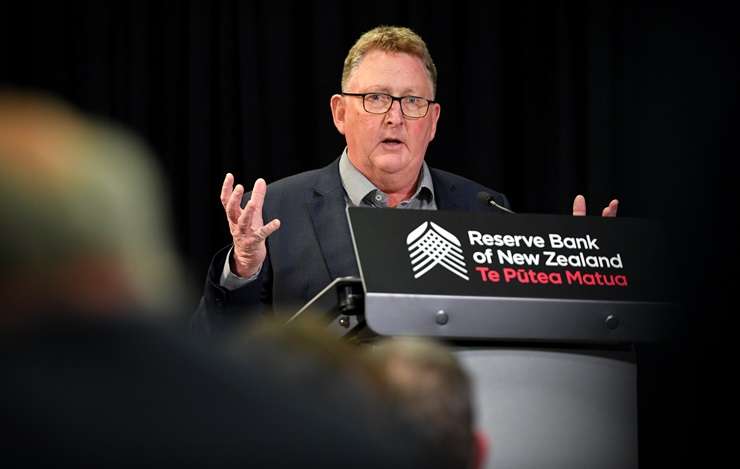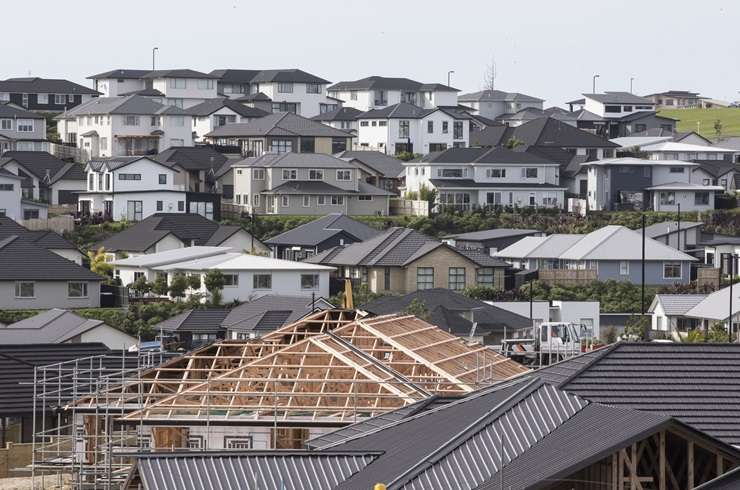The Reserve Bank of New Zealand’s decision on whether to hike the OCR next week will go down to the wire, says Kiwibank’s chief economist.
Jarrod Kerr says there is a real threat of a hike on February 28 but he thinks such a move is unnecessary and he hopes the RBNZ holds instead, telling OneRoof there is zero chance of a cut.
“I think they will be on hold but it’s going to be a very close call. It’s about crying wolf. They’ve cried wolf a few times and the market has ignored them.”
Kerr thinks the RBNZ is concerned about rate cut expectations in the market and will want to dampen that.
Start your property search
Read more:
- Number of $2m-plus home loans has doubled in last four years
- Revealed: The big rate discounts banks are offering in private
- Tony Alexander: Why NZ has suddenly gone dark on interest rate cuts
“The market had 100 basis points of rate cuts priced in this year and they looked at that and went ‘that’s too extreme’.”
Kiwibank economists think the Reserve Bank will start cutting much later in the year followed by more cuts next year, he said, but much-needed relief for homeowners is unlikely yet.
“They don’t want wholesale rates falling at this point, which obviously has been passed on a little bit by banks. They basically want that removed – they don’t want mortgage rates lower at this point.”
That’s where Kerr disagrees with the RBNZ.
“The tightening they have done already has worked. There’s a lot of financial stress out there so I think they’ve done more than enough to contain the economy. I mean, we’ve got very weak growth. Actually, we are contracting in part, so I think monetary policy is actually too tight.”
Homeowners are hurting enough. Kerr said during times of “high and horrible periods of inflation” lower income households generally got hit harder but this time around higher income, higher spending households were being affected.
“Those are the ones with the debt and they are being hit the hardest because of the rapid rise in interest rates.
“A lot of people are rolling off 2%, 3% mortgage rates onto 6%, 7% rates and that’s more than a doubling in your interest expense. That’s still coming through. I think about 90% of it has hit but it’s still hurting and according to the RBNZ the peak pain they are inflicting is coming through this year.”
The Reserve Bank will be thinking hard about whether to hold or hike, he said.
“Their bias is clearly towards trying to keep interest rates higher so I think if they don’t go, they will deliver a very hawkish commentary along the lines of ‘stop thinking about rate cuts, we are not there’. It will be a very firm message.”
If the RBNZ does deliver a hike, however, it will likely be 25 basis points this time and another 25 next time, and banks will pass the increase on to mortgages.
“That would go against what the market has been pricing in and the movement in mortgage rates recently. Mortgage rates have come down a little bit, not a lot, but banks are still wary the RBNZ hasn’t signalled they have finished hiking yet.”
A 25 basis point increase would add considerable stress to struggling households, Kerr said.
“Anyone who is rolling off from now would face an even higher rate. A lot of households have fixed for six months to one year in the expectation that interest rates will fall and if that’s not delivered then it’s just more pain for longer and I think it’s unnecessary.”

Reserve Bank Governor Adrian Orr. The RBNZ is concerned inflation is not yet under control. Photo / Getty Images
Kerr said inflation is still a global issue, including at home. While the United States has seen inflation drop from 9.1% to 3%, and has stayed thereabouts for the last six months, the initial drop is the easy part.
“Moving from 3 to 2 is proving to be quite difficult so it’s that last mile of the marathon that’s really hard for central banks.
“We’ve got a similar thing here. Our inflation rate has fallen from 7.3[%] to 4.7[%] and we are all expecting it to be closer to 3 this year but it’s kind of hammering out that last little bit, getting it from 3 to 2 which is proving to be hard offshore.”
But while Kerr understands central banks need to signal rates will be higher for longer, he reiterates he does not think New Zealand needs further rate hikes.
The economy is not “screwed”, he said. Businesses are finding the current market tough but they are adapting.
While they are still “putting out fires” at a CEO summit Kerr attended last week business leaders were positive about their labour supply having picked up and that they are facing less pressure from workers.
“This time last year employees were turning up with job offers and asking for pay rises, now that’s all stopped and it seems employees have become a lot more loyal so to me that just shows you how much the economy has slowed down.”
Immigration is a big issue, however, and needs to be tightened because there has been a record intake of migrants in the last year, although big numbers of people left as well.
But rents have already picked up on the back of the inflow of migrants: “Rents are running at higher rates than what they were pre-Covid so there’s clearly an increase in demand from the thousands of migrants that have arrived.”
Most will rent but some will buy and house prices, which have already started rising, will continue to rise this year.
“We will probably get around 6% or 7% price gains, so the migration part is a big bit. The fact that we have a shortage of housing to start with means prices are more likely to rise than fall.”
Kerr said the ongoing issue is infrastructure and adding hundreds of thousands of people without adding extra dwellings is not helping.
“Infrastructure is the big problem. Infrastructure is to blame for our lack of supply.”
Because house prices declined after the boom builders pulled back, also affecting supply.
“We need precisely the opposite. We need supply picking up quite rapidly.”

House-building on Auckland's northern fringes. Rising migration and falling consents could put extra pressure on house prices over the coming year. Photo / Greg Bowker
Kerr agrees these are recurring themes, saying while it’s good investors are likely to return to the market, because they build or buy much-needed homes, people are facing high rents because of the lack of homes amid a big increase in people numbers.
“You need to look at the infrastructure, or lack of infrastructure that hasn’t been built in decades.”
Each migration boom teaches the same story, he said, but successive governments do not seem to learn.
“We need to increase the supply of infrastructure and dwellings. You can’t just blame National or Labour, it’s both. I think they need a few more independent bodies looking at it so we don’t get sucked into election cycles.”
The country needs a proper plan for infrastructure and it needs to be properly financed.
“It’s just embarrassing, right. It’s embarrassing that Wellington loses, what is it, 40 or 45% of its water to leaks. For a clean and green country like New Zealand, which prides itself on being more eco-friendly and focused, we don’t walk the walk very well.
“We’re in a ridiculous situation where councils can’t afford to do the maintenance – we’re not even talking about keeping up with the population, we’re just talking about maintenance of existing infrastructure.”
- This story was created in partnership with Kiwibank
Use the search field to find out the best mortgage deals available today.










































































